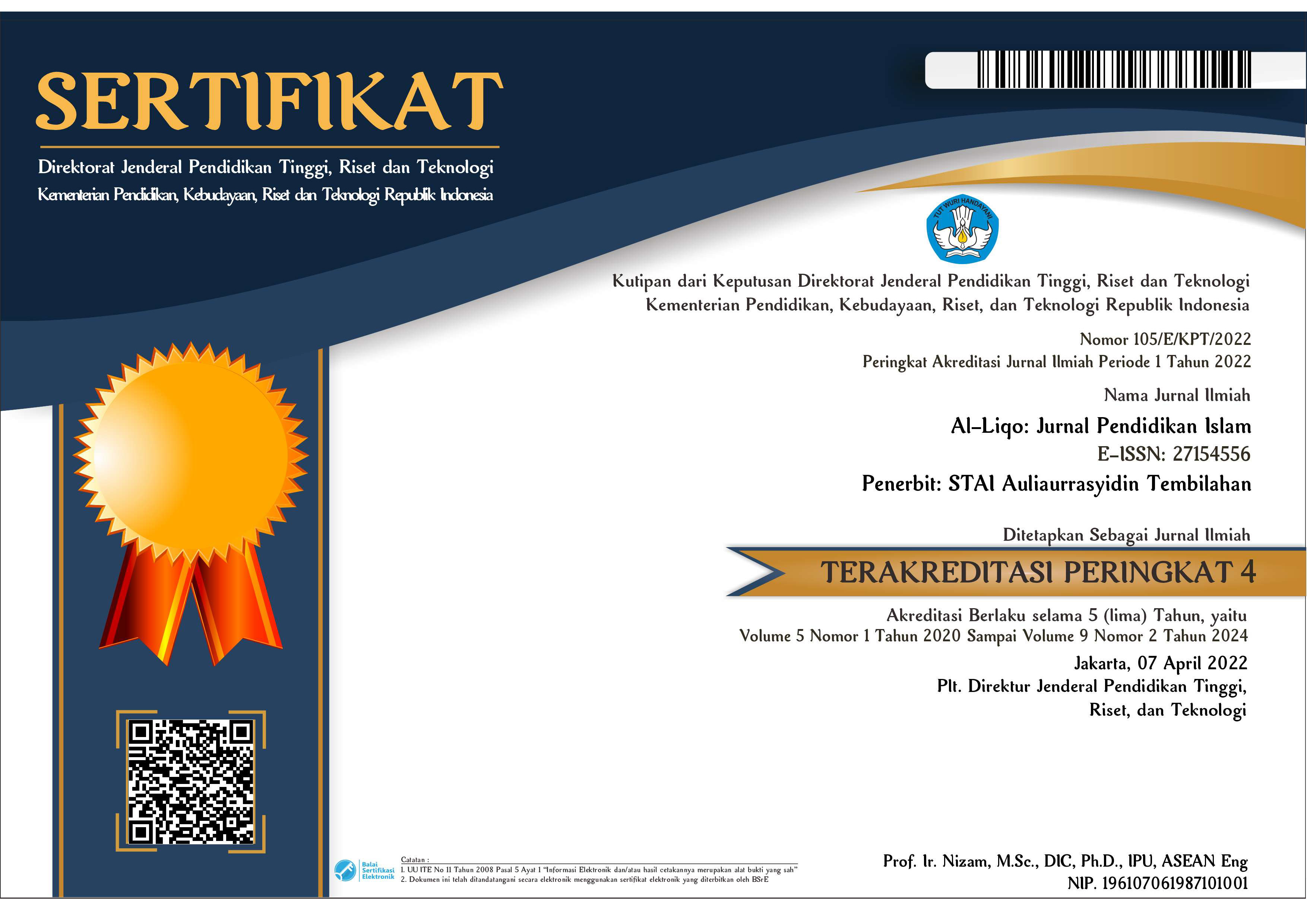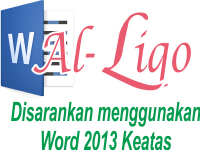Manajemen Pembinaan Karakter Mulia
DOI:
https://doi.org/10.46963/alliqo.v7i2.584Keywords:
Management, Coaching, Noble CharacterAbstract
The background of this research is that there are still many students arriving late to class, falling asleep in class, bullying among their friends, impolite behavior towards teachers, older students not loving younger students, not caring for the environment. well, and there are many other undisciplined things. The purpose of this study is the implementation of noble character development management, knowing the supporting and inhibiting factors in the implementation of noble character development. This study uses a descriptive qualitative research method. The results of this study are (1) noble character-building management planning, (2) the management mandate of noble character development, (3) the implementation of noble character development management, (4) the factors that become supporters and obstacles in the implementation of noble character development.
Downloads
References
Anwar, S. S., & Anwar, S. (2014). Pendidikan Karakter Qur'ani. Riau: Yayasan Indragiri.
Ardi, N. S. P., Sobri, A. Y., & Kusumaningrum, D. E. (2019). Manajemen pembinaan akhlak dalam penguatan pendidikan karakter peserta didik. JAMP: Jurnal Administrasi dan Manajemen Pendidikan, 2(1), 17-25.http://dx.doi.org/10.17977/um027v2i22019p17
Armaluddin, U. (2022). Manajemen Pembelajaran Dalam Peningkatan Mutu Madrasah Diniyah. Sharia: Jurnal Kajian Islam, 1(1), 27-36. Vol. 1 No. 1 (2022): Sharia: Jurnal Kajian Islam
Chindy, T. (2020). Kreativitas Guru Madarasah Diniyah Takmiliyah Awaliyah (MDTA) Al-Ikhlas Dalam Pembinaan Akhlak Santri di Desa Sidosari Kabupaten Seluma (Doctoral dissertation, IAIN BENGKULU). http://repository.iainbengkulu.ac.id/id/eprint/5322
Fahrilyani, D., Maisyaroh, M., & Kusumaningrum, D. E. (2019). Manajemen Pembinaan Karakter Peserta Didik Di Sekolah Dasar. JAMP: Jurnal Administrasi dan Manajemen Pendidikan, 2(4), 204-212.http://dx.doi.org/10.17977/um027v2i42019p204
Fattah, N. (2009). Landasan Manajemen Pendidikan. Bandung: PT. Remaja Rosdakarya.
Firdaus, M. A., & Erihadiana, M. (2022). Manajemen Peserta Didik Pendidikan Islam. Islamic Management: Jurnal Manajemen Pendidikan Islam, 5(01), 41-54.http://dx.doi.org/10.30868/im.v5i01.1991
Gunawan, I., &Benty, D. D. N. (2017). Manajemen Pendidikan: Suatu Pengantar Praktik. Bandung: Alfabeta.
Hasibuan, N. S., Idawati, I., Harahap, E. M., Purba, H. S. R., &Afifah, N. (2022). Manajemen Pendidikan Karakter Melalui Keterampilan Berbicara terhadap Peserta didik MDTA Muhammadiyah Pijorkoling. Jesya (Jurnal Ekonomi dan Ekonomi Syariah), 5(1), 1018-1027.https://doi.org/https://doi.org/10.36778/jesya.v5i1.681
Helmy, M. (2016). Peranan Dakwah dalam pembinaan umat. Semarang: Dies Natalis IAIN Walisongo Semarang, 31.
Latif, M. (2021). Teori Manajemen Pendidikan. Jakarta: Prenada media Group.
Maulidayani, S. P. I., Sari, N., Anwar, H. K., & Si, M. M. Manajemen Madrasah Diniyah Takmiliyah Awaliyah (MDTA). Jakarta: Cv. Pusdikra Mitra Jaya.
Mukaromah,K.(2021). Manajemen Pembinaan Karakter Religius Siswa Melalui Kegiatan Keagamaan di MA Plus Raden Paku Trenggalek.http://repo.uinsatu.ac.id/id/eprint/20951
Purba, S., Subakti, H., Kato, I., Chamidah, D., Muntu, D. L., Cecep, H., ... & Saputro, A. N. C. (2021). Teori Manajemen Pendidikan. Jakarta: Yayasan Kita Menulis.
Rahman, T., & Wassalwa, S. M. M. (2019). Implementasi Manajemen Pendidikan Karakter dalam Pembinaan Akhlak Peserta Didik. Jurnal Pendidikan Islam Indonesia, 4(1), 1-14. DOI: 10.35316/jpii.v4i1.175
Downloads
Published
Issue
Section
License
Copyright (c) 2022 Akhmad Alim, Ahmad Sastra, M. Ikbar Muhyi Maulani

This work is licensed under a Creative Commons Attribution-ShareAlike 4.0 International License.
Authors who publish with this journal agree to the following terms:
1. Copyright on any article is retained by the author(s).
2. The author grants the journal, right of first publication with the work simultaneously licensed under a Creative Commons Attribution shareAlike 4.0 International License that allows others to share the work with an acknowledgment of the work’s authorship and initial publication in this journal.
3. Authors are able to enter into separate, additional contractual arrangements for the non-exclusive distribution of the journal’s published version of the work (e.g., post it to an institutional repository or publish it in a book), with an acknowledgment of its initial publication in this journal.
4. Authors are permitted and encouraged to post their work online (e.g., in institutional repositories or on their website) prior to and during the submission process, as it can lead to productive exchanges, as well as earlier and greater citation of published work.
5. The article and any associated published material is distributed under the Creative Commons Attribution-ShareAlike 4.0 International License







2.png)



